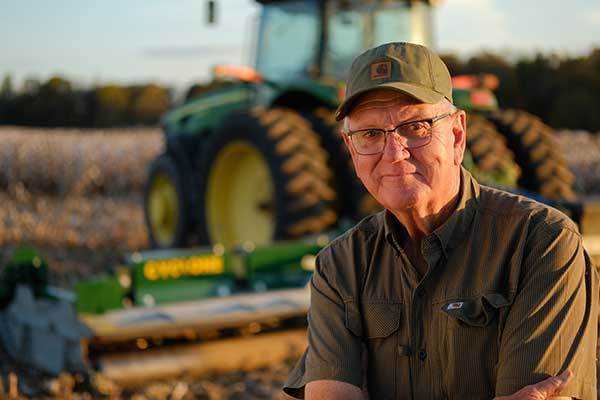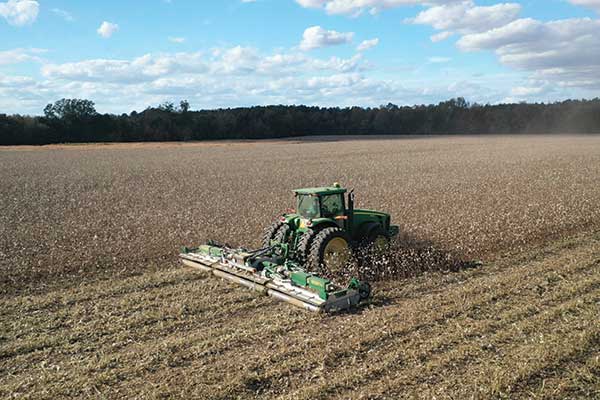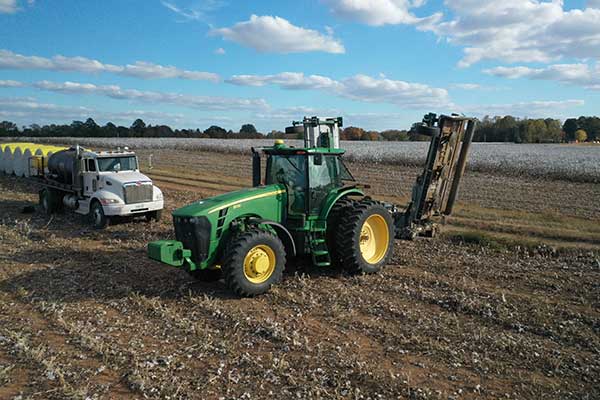New Shredder Pushes Efficiencies for Alabama Farmer
Fifth-generation farmer, Perry McNatt appreciates his family’s farming history, but understands the benefits new technologies and equipment, like the 30-ft Major Cyclone, deliver to keep him profitable.
The Elk River originates in Tennessee and carves a 195-mile meandering southwest path flowing past Limestone County cotton farmer Perry McNatt’s land before flowing into the Tennessee River at Wheeler Lake in Alabama. This year, McNatt grew the best cotton he’s ever harvested from his rich, rolling, fertile river bottom land, located just four miles from the Tennessee State line.
McNatt has two farming operations – located 200 miles apart. Yes, 200 miles.
“In addition to the land we farm here in Limestone County, we have a 1,600-acre operation in Black Belt of central Alabama, just west of Montgomery, where Hank Williams was laid to rest. It’s a beautiful spread,” says McNatt.
You would think working two operations that far apart would be nearly impossible, but McNatt has an ally, Nobie Daly. Daly farmed in Limestone County for several years.
“We became great friends, but Nobie wanted to get away from the increasing traffic and congestion in Limestone County. He bought a bigger farm in L.A. (lower Alabama) four years ago, and when 1,600 acres became available next to his operation, I bought it,” says McNatt.
“I told Perry when he bought the property next to mine, there was no need for him to drive all the way down here just to spray one field, fix a washout or mend a fence,” remembers Daly. “It’s just the nature of our friendship.”
Cotton grower with diversified arable crops
McNatt keeps a keen eye on commodity markets that help dictate what and how much of each commodity he plants each year. Although he considers himself a cotton farmer, he also grows corn and double-crops soybeans behind wheat.
Skip row cotton works for McNatt. It may require a little more plant growth regulator mid-year but it takes up fertilizer and accepts sunlight more efficiently – McNatt believes thanks to the skip middles.
McNatt is always looking for ways to be more efficient
When his two John Deere 7760 on-board module cotton harvesters arrived on the farm, McNatt’s farming efficiency skyrocketed.
“We went from a 10 or 12-man crew running boll buggies, module builders and tractors, to a crew half that size by eliminating all that equipment,” remembers McNatt. “Both harvesters pick six rows but we spread the headers out to pick 6 rows plus the skips, so we’re actually covering nine rows. Overall, it makes us 33% more efficient because we’re planting a skip row pattern. We also got an efficiency bump when we went to no-till in 1998. I haven’t pulled a plow across my fields in over 20 years.”
Major Cyclone doesn’t leave windrows
After harvest, McNatt cuts his stalks with a new shredder he bought through his Greenway Ag dealer – an MJ30-920 Cyclone shredder. The 30-foot-wide machine can tackle eight rows plus the skips – which equals about 29 feet.
“As with any new piece of equipment, you have to tailor it to your operation. Because we plant flat, we had to take the rubber flaps off so the shredded material could more easily discharge. It doesn’t leave wind rows and it’s been running great ever since,” says McNatt.
His Cyclone has 10 rotors, each with four blades made of a high-grade hardened steel. The shredder burns less fuel because it requires 50% less hp than a similar-sized flail mower.
“It’s made with a high performance Strenx 700 MC structural steel, that’s lighter and easier to handle on the 3-point hitch.” says McNatt. “It’s stronger, safer, and I believe more economically sustainable in the long run. We’ve only used it one season but I pull it with my John Deere 8130, 225 hp tractor and I’m expecting another efficiency gain from it in the long run.”
“They’ve been great to work with and really stand behind their products.”
When the Cyclone started having a small bearing issue, McNatt contacted his Greenway Ag dealer who touched base with the folks at Major Equipment, Co. They discussed the problem which eventually led to the equipment company making a complete bearing re-design – going to an oil-filled bearing that never needs greasing.
“They even sent me a new set of the new bearings,” says McNatt. “They’ve been great to work with and really stand behind their products.”
Two friends who farm close to McNatt’s operation stopped by to watch the Cyclone in action and were notably impressed.
“I’ve still got 1,500 acres of cotton to pick before I can start cutting stalks, but I’ll be hooking up the Cyclone when picking is done,” says McNatt. “I may even get another one for my farm in L.A.!”




